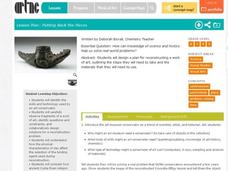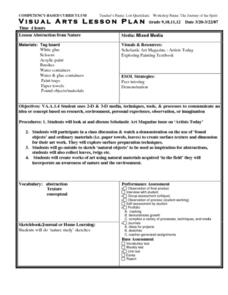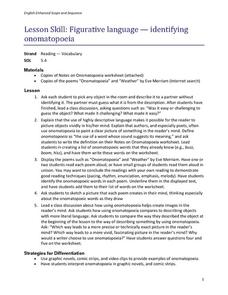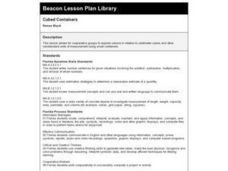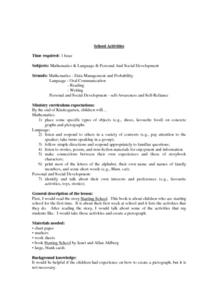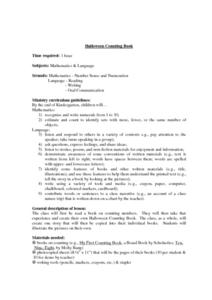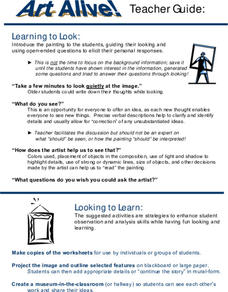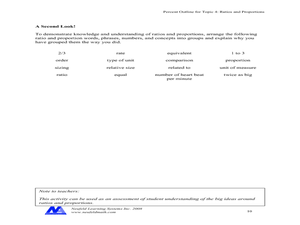It's About Time
Push or Pull - Adding Vectors
Demonstrate Newton's Second Law of Motion with an engaging lesson. Individuals explore the difference between forces in relation to a push or a pull, and they identify various forces that cause an object to move. They explore the concept...
Teach Engineering
Exploring Acceleration with an Android
Small groups use rubber bands to accelerate an Android device along a track of books. They collect the acceleration data and analyze it in order to determine the device's velocity.
Curated OER
Putting Back the Pieces
Seventh graders become museum conservators and undertake the hypothetical restoration of an ancient American work of art. Groups design a plan for reconstructing the work of art, outlining the steps they need to take and the materials...
Curated OER
The Journey of the Spirit
Students discuss Scholastic Art Magazine issue on 'Artists Today' . They participate in a class discussion & watch a demonstration on the use of 'found objects' and ordinary materials (i.e. paper towels, leaves) to create surface...
Curated OER
My Angle on Cooling
Students explore how the angle and distance of an object can change it's temperature. After reviewing how the position of the Earth affects the temperature of the planet, student groups design and perform an experiment to test how...
Curated OER
Figurative Language- Identifying Onomatopoeia
A study of onomatopoeia for 5th graders is here for you. Pupils discover that the use of highly descriptive language makes it possible for readers to picture objects in their minds. After engaging in a class discussion and listening to...
It's About Time
Concentrating on Collisions
How important is momentum? Pupils investigate and apply the definition of momentum as they conduct analyses during a series of one-dimensional collisions. They infer the relative masses of two objects by carefully staging and predicting...
American Chemical Society
Exploring Energy
When asked to list everyday objects that require energy, most people list technology that use batteries or electricity. Through hands-on exploration, young scientists discover energy is much more than just circuitry. They play with...
Curated OER
Cubed Containers
Learners explore volume in relation to centimeter cubes and other nonstandard units of measurement using small containers. They will use hands-on materials to practice this concept. You will need small objects and containers to set this up.
Curated OER
School Activities
First graders place some specific types of objects (e.g., shoes, favorite food) on concrete graphs and pictographs. They listen and respond to others in a variety of contexts (e.g., pay attention to the speaker; take turns speaking in a...
Curated OER
Halloween Counting Book
First graders recognize and write numerals from 1 to 10. They estimate and count to identify sets with more, fewer, or the same number of objects, listen and respond to others in a variety of contexts, and take turns speaking in a...
Curated OER
View Tubes: Student Worksheet
Here is a instructional activity that is almost a lesson! In it, learners conduct an experiment in which they determine the size of objects when viewed through viewing tubes. This resource has all of the instructions and tables necessary...
Perkins School for the Blind
Hat Game
Sometimes the simplest ideas foster a lot of different skills. To boost social skills, group participation, identifying others by name, and dressing skills, learners play the hat game. They take turns wearing a hat while...
Illustrative Mathematics
Teen Go Fish
Kindergartners play the classic game Go Fish as they practice identifying numbers in the teens. A fun and engaging activity that develops number recognition skills in young learners. As added support, provide cards that include both the...
Illustrative Mathematics
Measure Me!
How many unifix cubes tall are you? If you're not sure, then perform this math activity with your class and find out. Working in pairs, young mathematicians make measuring sticks out of unifix cubes in order to determine the length of...
Michigan Technological University
Giant Mirrors
Did you know some retailers use curved mirrors in their fitting rooms to make customers look thinner? Pupils view themselves in convex and concave mirrors to understand the difference. The resource includes big ideas for multiple age...
Smithsonian Institution
World War II
December 7th is remembered as a tragic time in American history, but some scholars may not know why. The resource explains the significance of the bombing of Pearl Harbor as well as how World War II relates to American history. The...
Curated OER
Erosion in Different Soils
Fourth graders observe and identify the effects of weathering and geological activities. They take part in an excellent hands-on group activity called "Erosion Race," in which each group tries to simulate erosion of soil in the quickest...
Memorial Art Gallery
Art Alive! - Towing a Boat, Honfleur
Color, light and shadow, the placement and size of objects. These are some of the tools artists used to tell their stories. Model for learners how to read a painting by closely examining these features. The richly detailed packet...
Curated OER
Exploring Number and Operation in Secondary Mathematics
Young geometers need a clear understanding of perimeter, volume, and area. This lesson provides a worksheet to help small groups of learners to calculate various measurements of objects and choose the proper units for measurement. It...
Curated OER
A Fair Trade
Students examine a piece of art to find objects and symbols used by the artist. In this visual art lesson, students look at Jaun Quick-to-See Smith's, "Trade Canoe for Don Quixote." They look for symbols and items that show the artists...
Neufeld Learning Systems
Concept: Ratios and Proportions
Upper elementary and middle school pupils fill out a chart creating six equivalent fractions and then compare them to six different objects and/or shapes. They group together 16 various terms related to ratios and proportions. Pupils...
Curated OER
My Own Backyard
Students explore and react to the painting The Road to Santa Fe. In this interacting with art instructional activity, students locate various objects in the painting. Students copy the angle of objects by using their bodies. ...
TryEngineering
What is a Nanometer?
Exactly how small is a nanometer? Scholars investigate the scale of a nanometer by measuring classroom objects and converting these measurements to nanometers.




